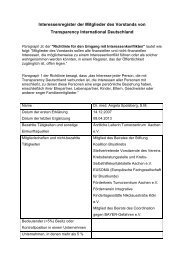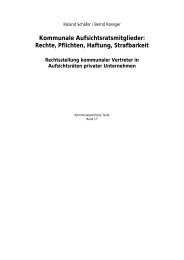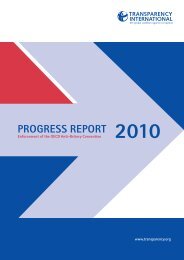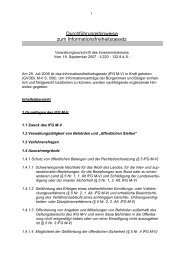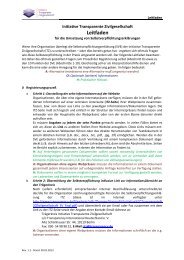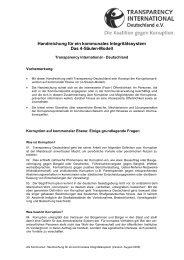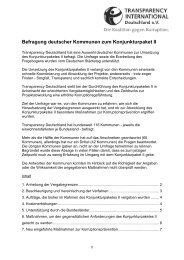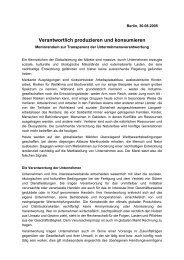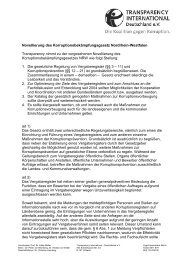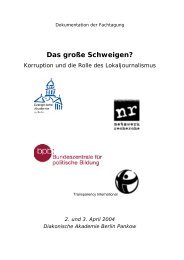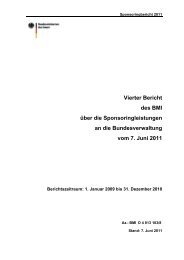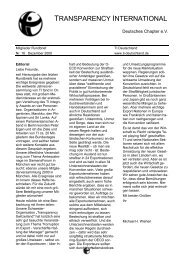Transparency International Germany - European Commission
Transparency International Germany - European Commission
Transparency International Germany - European Commission
Create successful ePaper yourself
Turn your PDF publications into a flip-book with our unique Google optimized e-Paper software.
Vorsitzende: Prof. Dr. Edda Müller<br />
Stellv.: Dr. Peter von Blomberg, Dr. Hedda von Wedel<br />
Geschäftsführer: Dr. Christian Humborg<br />
– 5 –<br />
Do domestic judicial authorities cooperate in full and offer mutual legal assistance to<br />
requesting foreign judicial authorities? Do domestic judicial authorities offer sufficient<br />
cooperation both to requesting states and to various regional authorities engaged in criminal<br />
investigation and prosecution across borders (Europol, Eurojust, OLAF etc)? Is there sufficient<br />
national legislation for international cooperation to enable any potential <strong>European</strong> Public<br />
Prosecution Office (and the aforementioned regional authorities) to prosecute cross-border<br />
corruption-related cases?<br />
2) Problem: weak access to justice: insufficient initiation of investigations by police and<br />
public prosecution services<br />
Does access to information legislation exist to allow for the disclosure for documents related to<br />
corruption-related investigations, both in the pre-trial phase and the trial phase before a<br />
domestic court? How many of such investigations result in charges and enter the trial phase<br />
before a domestic court?<br />
3) Problem: inefficiency of court proceedings<br />
How many corruption-related cases are brought before domestic courts and found<br />
admissible? How many of those cases result in acquittals?<br />
4) Problem: impunity<br />
How many corruption-related court proceedings lead to successful prosecutions, i.e.<br />
convictions? How many cases result in a court verdict and/or in settlements? How many of<br />
those cases lead to a verdict, impose a fine and/or imprisonment as sanction? Are member<br />
states supported to seize and confiscate profits from criminal activities in order to ensure that<br />
crime does not pay?<br />
The different national legal situations must be considered in order to draw conclusions under 3<br />
and 4.<br />
Question 5: What incentives could be applied to offer the best chance for member states to implement<br />
recommendations contained in an EU reporting mechanism? (Examples: An anti-corruption fund for<br />
implementing certain measures (e.g. setting up or strengthening anti-corruption institutions, complaint<br />
mechanisms, providing training or conducting awareness raising campaigns)<br />
A range of incentives can be proposed:<br />
- Demonstrating political will and concrete action against corruption: the EU and national<br />
governments should speak out more courageously against corruption to confirm the high-level<br />
political commitment against corruption.<br />
- The EU should use positive incentives by "naming and faming" well performing member states<br />
and highlight good examples and best practices. At the same time, the EU should not shy away<br />
from naming issues and systemic weaknesses in other member states. A ranking of member<br />
states from best to worst could prove to be an incentive.<br />
- It is recommended that a mechanism for EU member states (and those countries which receive<br />
EU budget support) is developed, with which sanctions could be imposed on those member<br />
states and/or companies that misappropriated EU funds (similar to, for instance, the freezing of<br />
EU funds for Bulgaria). A debarment system for member states or companies which are found<br />
guilty of cases of corruption or fraud involving EU funds should be established.<br />
- An anti-corruption fund for implementing anti-corruption measures should be established. Through<br />
the fund awareness-raising and education campaigns against corruption should be supported<br />
at the EU level and in all EU member states.<br />
Additional Question: Why is there a need for the EU to take on a stronger role in the fight against<br />
corruption?<br />
Corruption acts as a serious distortion of competition within the internal <strong>European</strong> market. As<br />
stated goal of the <strong>European</strong> Union is to provide for a competitive <strong>European</strong> marketplace, the EU<br />
has an obligation to make private sector corruption a primary concern in all policies<br />
Corruption comes at a high cost for EU citizens.<br />
<strong>Transparency</strong> <strong>International</strong> - Deutschland e.V.<br />
Alte Schönhauser Str. 44<br />
D-10119 Berlin<br />
HypoVereinsbank Berlin<br />
Konto 5611 679<br />
BLZ 100 208 90



